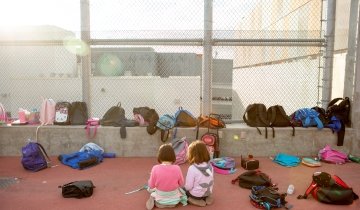Today, USC Rossier School of Education announced that Brendesha Tynes, Dean's Professor of Educational Equity and a professor of Education and Psychology at USC, is the recipient of a $4.6 million National Institutes of Health (NIH) Transformative Research Award. Tynes will use this grant—the largest federally-funded grant in USC Rossier history—to study how digital and media literacy training and the development of an immersive virtual reality experience can help combat bullying that impacts the mental health of students.
Established in 2009, the Transformative Research Award promotes cross-cutting, interdisciplinary approaches and is open to individuals and teams of investigators who propose research that could create or challenge existing paradigms. It is among the most prestigious in the U.S. and is reserved for exceptionally creative scientists.
Tynes will work with co-investigators Marientina Gotsis, professor at the USC School of Cinematic Arts, and Henry Willis, assistant professor of Clinical Psychology at the University of Maryland. The team will also include a postdoc as well as K–12, undergraduate and graduate students.
“It is a tremendous honor to receive this award from the NIH Director’s High-Risk High-Reward Research Program. It allows me to build on twenty years of research on the digital landscape adolescents navigate at a time when the terrain has never been more treacherous,” Tynes said.
“The constant barrage of online bullying has been especially detrimental to adolescents, some of whom are now inundated with dehumanizing messages on a daily basis. What’s more, schools have failed to prepare students to deal with this crisis. This can have grave consequences, not only for their mental health, but their life chances,” Tynes continued.
“Through this $4.6 million grant, we will develop and test the efficacy of a virtual platform that improves students’ digital and media literacy and helps them develop tools to challenge and overcome traumatic online experiences. This will be a first-of-its-kind platform, and this study will provide an opportunity to transform how young people learn about technology and mental health. My goal is to create a digital intervention that helps young people thrive online and offline. I am excited to get to work,” Tynes concluded.
“Brendesha Tynes has always been an innovator and leader in her field,” said USC Rossier School of Education Dean Pedro Noguera. “Children are highly impressionable as they form their self-identity and perceptions of the world. Brendesha’s proposal was selected out of many applications because of its high potential to change the status quo and develop technologies that can improve learning and mental health outcomes for students across the nation. USC Rossier is deeply proud of Brendesha Tynes and looks forward to seeing the good that will come from this research.”
This research was made possible through the NIH Common Fund under Award Number (R01HD115249-01). The content is solely the responsibility of the authors and does not necessarily represent the views of the National Institutes of Health. An NIH statement about this award can be viewed here.






